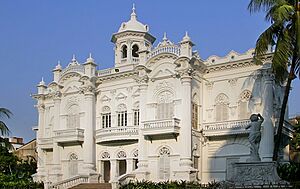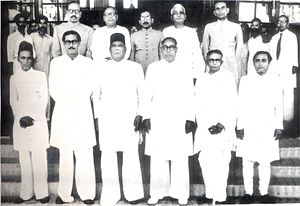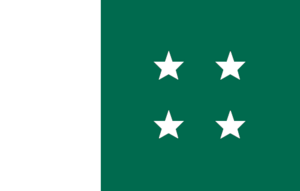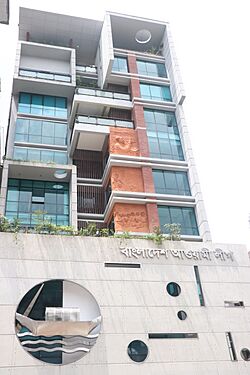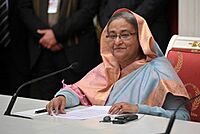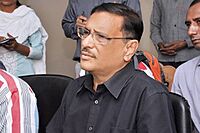Awami League facts for kids
Quick facts for kids
Bangladesh Awami League
Bangladesh People's League বাংলাদেশ আওয়ামী লীগ
|
|
|---|---|
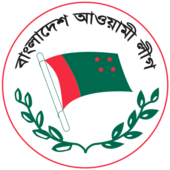 |
|
| Abbreviation | AL |
| President | Sheikh Hasina |
| General Secretary | Obaidul Quader |
| Founders | Abdul Hamid Khan Bhashani Sheikh Mujibur Rahman Shawkat Ali Yar Mohammad Khan Shamsul Huq |
| Founded | 23 June 1949 (as the Awami Muslim League) 26 March 1971 (current form) |
| Preceded by | AML |
| Headquarters | 23 Bangabandhu Avenue, Dhaka |
| Newspaper | Uttaran |
| Think tank | Centre for Research and Information |
| Student wing | Bangladesh Student League |
| Youth wing | Bangladesh Awami Jubo League |
| Women's wing | Bangladesh Mohila Awami League |
| Farmer wing | Bangladesh Krishak League |
| Trade union wing | Bangladesh Jatiya Sramik League |
| Volunteer wing | Bangladesh Awami Swechasebak League |
| Armed wing | Jatiya Rakkhi Bahini (1972–1975) |
| Political position | Centre |
| National affiliation | Grand Alliance |
| Colors | Green |
| Slogan | Joy Bangla, Joy Bangabandhu ("Victory to Bengal, victory to Bangabandhu") |
| Anthem | Pralayollas ("The Ecstasy of Destruction") |
| Seats in Jatiya Sangsad |
272 / 350
|
| Mayor in City Corporations |
10 / 12
|
| Councillor in City Corporations |
480 / 640
|
| Chairmen in District Councils |
52 / 64
|
| Chairmen in Subdistrict Councils |
320 / 495
|
| Chairmen in Union Councils |
2,187 / 4,554
|
| Election symbol | |
 |
|
| Party flag | |
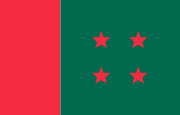 |
|
The Bangladesh Awami League (Bengali: বাংলাদেশ আওয়ামী লীগ), often called the Awami League or AL, is a major political party in Bangladesh. It is the oldest political party still active in the country. The Awami League successfully led Bangladesh to its independence. It is one of the two most powerful parties in the country, along with the Bangladesh Nationalist Party. The Awami League has been the ruling party since 2009.
The All Pakistan Awami Muslim League was started in Dhaka in 1949. This was in East Bengal, which was then part of Pakistan. Abdul Hamid Khan Bhashani and Shamsul Huq founded it. Later, Huseyn Shaheed Suhrawardy, who became Prime Minister of Pakistan, joined them. The party was created to offer Bengalis an alternative to the Muslim League. It quickly became very popular in East Bengal, which was later called East Pakistan. The party then led the fight for Bengali nationalism against the government in West Pakistan.
Under the leadership of Sheikh Mujibur Rahman, the party led the struggle for independence. This began with large public movements like the Six Point Movement. It continued through the 1971 Non-Cooperation Movement and the Bangladesh Liberation War.
After Bangladesh became independent, the Awami League won the first general elections in 1973. However, the party was removed from power in 1975 after Sheikh Mujibur Rahman was killed. Military governments then pushed the party to the side. Many of its leaders and activists were arrested or killed. After democracy returned in 1990, the Awami League became a main player in Bangladeshi politics.
Five leaders from the Awami League have become the President of Bangladesh. Four have become the Prime Minister of Bangladesh. One even became the Prime Minister of Pakistan. The current Prime Minister of Bangladesh, Sheikh Hasina, has led the party since 1981.
Contents
History of the Awami League
Founding and Early Years (1949–1966)
After the British left, East Bengal became part of Pakistan. The Muslim League party, led by Muhammad Ali Jinnah, was very powerful.
In 1948, people in East Bengal were upset because the Bengali language was not being used on coins or in government exams. Students protested in Dhaka. Leaders like Shamsul Huq were arrested. In March, Bengali political leaders were attacked for demanding Bengali be an official language. A. K. Fazlul Huq, a former Prime Minister of Bengal, was among them.
Amidst this unrest, Jinnah visited Dhaka. He announced that Urdu would be the only official language of Pakistan. This upset many Bengalis, who spoke Bengali and found Urdu difficult. They also felt discriminated against in government and jobs. Bengalis were the majority of Pakistan's population. They felt proud of their language and culture. This led to a strong sense of Bengali nationalism.
On 23 June 1949, Bengali nationalists formed the All Pakistan Awami Muslim League. They broke away from the Muslim League. Maulana Abdul Hamid Khan Bhashani became the first president. Shamsul Huq was the first general secretary. Sheikh Mujibur Rahman was one of the first joint secretaries. The party aimed to protect the rights of ordinary people against the powerful Muslim League. Because most of its support came from East Bengal, the party became closely linked with that region.
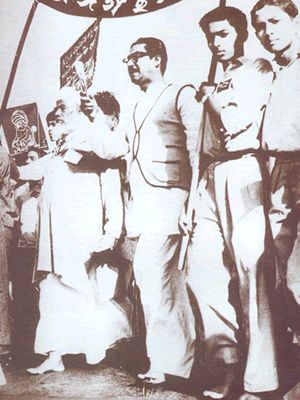
In 1952, the Awami Muslim League helped lead the Bengali Language Movement. During this time, Pakistani forces shot at students protesting for Bengali to be an official language. Several students were killed, including Abdus Salam and Rafiq Uddin Ahmed. Historians see these events as a key moment. They marked the beginning of the Bengali nationalist struggle. This struggle eventually led to Bangladesh's creation in 1971.
In 1953, the party decided to remove the word "Muslim" from its name. It became simply the Awami League. This showed its commitment to being a party for everyone, not just Muslims. Before the 1954 East Bengal elections, the Awami League helped form the United Front. This alliance included other parties. They created a 21-point plan to fight for rights in East Pakistan. The party chose the traditional Bengali boat as its election symbol. This symbol showed its connection to rural Bengal.
The United Front won the 1954 election by a huge margin. They won 223 out of 237 seats. The Awami League alone won 143 seats. A. K. Fazlul Huq became the Chief Minister of East Bengal. Sheikh Mujibur Rahman from the Awami League served as commerce minister. The new government demanded more power for East Bengal. They also helped make Bengali an official language of Pakistan. They also set up the Bangla Academy in Dhaka.
However, the Governor-General, Malik Ghulam Muhammad, dismissed the United Front government in May 1954. This happened because of growing tensions with West Pakistan.
In September 1956, the Awami League formed a government in the central capital. Awami League President Huseyn Shaheed Suhrawardy became the Prime Minister of Pakistan. Suhrawardy tried to reduce economic differences between East and West Pakistan. He also wanted more Bengalis in government jobs.
The Awami League government also joined alliances like SEATO and CENTO. Maulana Bhashani, one of the party's founders, disagreed with this decision. He left the Awami League and formed the National Awami Party (NAP).
Disagreements over how Pakistan should be governed also caused problems. Suhrawardy resigned as Prime Minister in October 1957.
On 7 October 1958, President Iskander Mirza declared martial law. Army chief General Ayub Khan took control. Ayub Khan banned all major political parties, including the Awami League. Many senior politicians were arrested until 1963.
In 1962, Ayub Khan created a new constitution. It used an indirect election system. Huseyn Shaheed Suhrawardy joined other leaders to form the National Democratic Front. They wanted to restore democracy. However, their efforts did not succeed.
Discrimination against Bengalis was common during Ayub Khan's rule. The University of Dhaka became a center for student protests. They demanded more rights for Bengalis and the return of democracy.
On 5 December 1963, Huseyn Shaheed Suhrawardy died suddenly. Many people in East Pakistan believed he had been poisoned.
Struggle for Independence (1966–1975)

Sheikh Mujibur Rahman proposed the Six Points. These demands called for greater self-rule for Pakistan's provinces. People in East Pakistan widely supported them. After the Agartala Conspiracy Case and the end of Ayub Khan's rule, Sheikh Mujib and the Awami League became very popular.
In the 1970 elections, the Awami League won almost all seats in East Pakistan. They won 167 out of 169 seats in the National Assembly. They also won 288 out of 300 provincial assembly seats in East Pakistan. This gave the Awami League a clear majority in the National Assembly. They could form a national government without needing other parties. However, leaders in West Pakistan did not accept this. They worried the Six Points would break up the country. This led directly to the events of the Bangladesh Liberation War.
Awami League leaders took refuge in India. They successfully led the war against the Pakistan Army throughout 1971. Sheikh Mujibur Rahman was arrested by the Pakistan Army on 25 March 1971. But the people of Bangladesh continued fighting for nine months.
After winning the war on 16 December 1971, the party formed the first government of independent Bangladesh. In 1972, under Sheikh Mujib, the party's name was changed to "Awami League." The new government faced many challenges in rebuilding the country. The party was accused of corruption. In 1974, Bangladesh suffered a severe famine. This caused support for Mujib to decline.
In January 1975, Mujib declared a state of emergency. He later became president. The Awami League-dominated parliament changed the government system to a presidential one. Sheikh Mujib renamed the League the Bangladesh Krishak Sramik Awami League (BAKSAL). He also banned all other parties. This led to a difficult political situation. BAKSAL was dissolved after Sheikh Mujibur Rahman was killed.
On 15 August 1975, some junior army officers killed Sheikh Mujibur Rahman and his family. Only Sheikh Hasina and Sheikh Rehana, Mujib's two daughters, survived. They were in West Germany at the time. Later, on 3 November 1975, four more top leaders were killed in prison. These included Syed Nazrul Islam and Tajuddin Ahmed. Sheikh Hasina later moved to India and lived in exile. Her time abroad helped her gain important political friends.
Struggle for Democracy and Hasina Era (1981–Present)
After 1975, the party was divided into several groups. It did not do well in the 1979 elections. In 1981, Sheikh Hasina returned to Bangladesh. The largest group of the Awami League elected her as its president. She then took over the party leadership and united the different groups.
For the next nine years, General Hussain Muhammad Ershad ruled the country. The Awami League participated in some elections but boycotted most. They believed Ershad did not support true democracy. In 1986, the Awami League took part in elections organized by Ershad. However, observers called these elections unfair.
In the 1991 elections, the Awami League became the largest opposition party. Khaleda Zia became the first female prime minister.
The Awami League's second time in power (1996-2001) had mixed results. The government kept the economy stable during the Asian economic crisis. They also solved a long-standing water dispute with India over the Ganges River. They signed a peace treaty with tribal rebels in 1997. In 1998, Bangladesh faced severe floods, which the government managed well. They also controlled inflation and ended a long-running conflict in some southwestern districts. However, there were accusations of corruption against party officials. The law and order situation also worsened.
The party won only 62 out of 300 parliamentary seats in the 2001 elections. This was despite getting 40% of the votes. The BNP and its allies won a large majority.
During its second time in opposition (2001-2008), several key Awami League members were killed. A member of parliament, Ahsanullah Master, was killed in 2004. Later that year, there was a grenade attack on Sheikh Hasina during a public meeting. Twenty-two party supporters died, but Hasina survived. The party's former finance minister, Shah S M Kibria, was also killed in a grenade attack.
In June 2005, the Awami League won an important mayoral election in Chittagong. This was seen as a major win against the BNP. However, the killing of party leaders continued.
In September 2006, several top leaders were injured by police during protests. These protests were about changes to election laws. From late October 2006, the Awami League led protests and blockades. They wanted a neutral caretaker government to oversee the 2007 elections. An election was planned for January 2007, but the Awami League decided to boycott it. On 11 January 2007, the military stepped in and set up an interim government.
In 2007 and 2008, the military-backed government tried to fight corruption. They also tried to remove Sheikh Hasina and Khaleda Zia from politics. These efforts mostly failed. However, they did create a reliable list of voters. This list was used in the national election on 29 December 2008.
The Awami League won the 2008 national election. They were part of a larger alliance that included the Jatiya Party. The Awami League won 230 out of 299 seats. With its allies, they had 262 seats in total. The Awami League and its allies received 57% of the votes. Sheikh Hasina became the new Prime Minister in January 2009. Her cabinet included several women in important roles.

Since 2009, the Awami League government has faced challenges. These include a mutiny by the Bangladesh Rifles, power shortages, and issues in the garment industry. The party achieved some legal successes. They restored the original 1972 constitution. They also brought back secularism to the constitution. Trials for war crimes began, and there was a guilty verdict in the 1975 assassination trial.
In the 2014 election, the Awami League alliance won a second term. However, 154 out of 300 Members of Parliament were chosen without an election. Only 5% of voters participated. The main opposition party, BNP, boycotted the election. This was because the caretaker government system was removed from the constitution. This election was controversial due to violence and arrests of opposition leaders.
Party Name and Symbols
The All Pakistan Awami Muslim League was formed in 1949. It was a group that broke away from the "All Pakistan Muslim League". In 1953, the word "Muslim" was removed. The party became the secular Awami League. During the Bangladesh Liberation War in 1971, most Awami League members joined the fight for independence. The name "Bangladesh Awami League" was eventually chosen.
The most common symbol for the party is the boat. This represents its connection to rural Bengal. The party did not always have a specific color. After the 1991 election, green became linked with the Awami League. Blue became the color for its main rival, the Bangladesh Nationalist Party.
The greeting "Joy Bangla" (meaning Victory to Bengal or "Long live Bengal") is the official slogan of the Awami League. It was the battle cry of the Mukti Bahini, who fought for Bangladesh's independence in 1971. Party members often use "Joy Bangla, Joy Bangabandhu" at the end of speeches. This phrase shows patriotism towards Bangladesh and Bangabandhu Sheikh Mujib.
The Awami League party flag is green with four red stars in the center. It also has a vertical red stripe on the left side. The four stars on the flag represent the party's four main ideas: nationalism, secularism, socialism, and democracy.
Party Ideas and Policies
Sheikh Mujibur Rahman's Vision
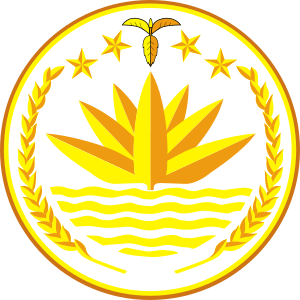
The Awami League's ideas have changed over time. The party's current ideas are based on four main principles. These are democracy, socialism, secularism, and nationalism. These principles come from Sheikh Mujibur Rahman's political thinking.
Economy and Development Plans
The party used to support a socialist economy. This meant the government had a lot of control over businesses. Under Sheikh Mujibur Rahman, the party used a system with strict rules for the economy. It was described as "neither capitalist nor socialist." Since Sheikh Hasina became leader in 1981, the party has moved towards more free market ideas.
Before the 2008 elections, the Awami League announced "Vision 2021" and "Digital Bangladesh". These plans aimed to make Bangladesh a fast-developing, middle-income country by 2021. The party also announced the "Smart Bangladesh" initiative. This is part of the Bangladesh Vision 2041 plan. It aims to make Bangladesh a technologically advanced and sustainable society. The goal is to reduce income inequality and improve the standard of living.
Caring for the Environment
In 2011, the Awami League government added Article 18A to the Constitution of Bangladesh. This article aims to protect and improve the environment. The Awami League also promised to protect the country's environment in its 2024 election plan. Sheikh Hasina's government adopted the Bangladesh Delta Plan 2100. This plan looks at water management, land use, and climate change. Her government has been praised for dealing with natural disasters and promoting awareness about climate change.
Foreign Relations
Between 1972 and 1975, Sheikh Mujibur Rahman played a key role in Bangladesh's foreign policy. His government successfully gained recognition from most major countries.
The Awami League is often seen as being friendly with India. "Bangladesh has had a good relationship with India under PM Sheikh Hasina." After the Awami League formed a government in 1996, it adopted policies that favored India. This continued after 2009. In 2015, Hasina signed a historic land exchange agreement with Indian PM Narendra Modi. This solved a long-standing border issue.
The Awami League has also maintained good relations with China. "Hasina has skillfully balanced ties with both India and China."
Sheikh Hasina's government allowed Rohingyas to take refuge in Bangladesh. She received praise for this both at home and abroad.
The Awami League continues to support the Palestinian cause. In 1972, the Awami League government officially rejected Israel's recognition of Bangladesh. In 2014, Sheikh Hasina said that Bangladesh continues to support Palestinians.
Party Structure
Party Constitution
The Constitution of the Bangladesh Awami League has 24 articles. It covers the party's goals, membership, and organization. The constitution is updated at National Conferences to fit changing situations.
National Conference
The National Conference is the party's highest body. It has been held every three years since 1949, though sometimes less regularly. The National Conference has several important jobs:
- electing the President
- electing the general secretary
- reviewing reports from the Central Working Committee
- discussing and setting party policies
- updating the party's constitution
In practice, most important discussions happen among top leaders before the Conference. Between Conferences, the Central Working Committee makes the main decisions.
Central Working Committee
The Central Working Committee includes the party's top leaders. It currently has 81 full members and 29 alternate members. Members are elected every three years at the National Conference. The Central Working Committee includes:
- The Party Presidium:
- The Party President
- 17 Presidium Members
- The General Secretary
- 4 Joint General Secretaries
- The Treasurer
- 28 Additional Members
- 29 Secretaries of different sub-committees
- 10 Parliamentary Committee members
Members of the Presidium
The Presidium of the Awami League is the party's highest decision-making group. Since the Awami League has been the ruling party since 2009, it is also one of the most important decision-making bodies in Bangladesh.
The current members of the Presidium include: 1. Sheikh Hasina 2. Matia Chowdhury 3. Sheikh Fazlul Karim Selim 4. Kazi Zafarullah 5. Mosharraf Hossain 6. Pijush Kanti Bhattacharya 7. Muhammad Abdur Razzaque 8. Muhammad Faruk Khan 9. Shajahan Khan 10. Jahangir Kabir Nanak 11. Abdur Rahman 12. A. H. M. Khairuzzaman Liton 13. Mofazzal Hossain Chowdhury Maya 14. Md. Qamrul Islam 15. Simeen Hussain Rimi 16. Mostafa Jalal Mohiuddin
Advisory Council
The Advisory Council has about 38 members. They act as the party's think-tank. They are not part of the Central Working Committee. The Advisory Council is the highest advisory body of the Bangladesh Awami League.
Centre for Research and Information
The Centre for Research and Information (CRI) is the Awami League's research group. It provides political education and conducts research. It also supports youth programs and international cooperation.
Party Activities
- Let's Talk: A program for discussions.
- Policy Café: A platform for policy discussions.
- CRI Junction: A meeting point for ideas.
- Young Bangla and CRI: The Young Bangla program helps young people and youth-led organizations. It provides resources and training.
Party Wings
| Type | Official Name | Common Term |
|---|---|---|
| Student Wing | Bangladesh Chhatra League | Chhatra League |
| Youth Wing | Bangladesh Awami Jubo League | Jubo League |
| Women's Wing | Bangladesh Mohila Awami League | Mohila League |
| Farmer Wing | Bangladesh Krishak League | Krishak League |
| Trade Union Wing | Bangladesh Jatiya Sramik League | Jatiya Sramik League |
| Volunteer Wing | Bangladesh Awami Swechasebak League | Swechasebak League |
Leaders of the Awami League (1949–Present)
| President | Elected (National Council; NC) |
In Office | Term length | General Secretary |
|---|---|---|---|---|
| Abdul Hamid Khan Bhashani | NC: 1949, 53, 55 | 23 June 1949 – 27 July 1956 | 7 years, 34 days | Shamsul Huq Sheikh Mujibur Rahman |
| Huseyn Shaheed Suhrawardy | (acting) | 27 July 1956 – 10 October 1957 | 1 year, 75 days | Sheikh Mujibur Rahman |
| Abdur Rashid Tarkabagish | NC: 1957, 64 | 10 October 1957 – 25 January 1966 | 8 years, 107 days | Sheikh Mujibur Rahman |
| Sheikh Mujibur Rahman | NC: 1966, 70, 72 | 25 January 1966 – 18 January 1974 | 7 years, 358 days | Tajuddin Ahmad Zillur Rahman |
| Muhammad Qamaruzzaman | NC: 1974 | 18 January 1974 – 24 February 1975 | 1 year, 37 days | Zillur Rahman |
| Dissolution (see:BAKSAL) | ||||
| Syeda Zohra Tajuddin (Convenor) | Special Council: 1977 | 4 April 1977 – 16 February 1978 | 318 days | None |
| Abdul Malek Ukil | NC: 1978 | 16 February 1978 – 16 February 1981 | 3 years, 0 days | Abdur Razzaq |
| Sheikh Hasina | NC: 1981, 87, 92, 97, 02, 09, 12, 16, 19, 22 | 16 February 1981– present | 45 years, 11 days | Abdur Razzaq Syeda Sajeda Chowdhury Zillur Rahman Abdul Jalil Sayed Ashraful Islam Obaidul Quader |
State Leaders from the Awami League (1971–Present)
President of Bangladesh |
|||
| Name | Term in office | ||
|---|---|---|---|
| Sheikh Mujibur Rahman | 1971–1972 | ||
| Abu Sayeed Chowdhury | 1972–1973 | ||
| Mohammad Mohammadullah | 1974–1975 | ||
| Sheikh Mujibur Rahman | 1975 (Killed) | ||
| Khondaker Mostaq Ahmad | 1975 (Removed from power) | ||
| Abu Sadat Mohammad Sayem | 1975–1977 | ||
| Zillur Rahman | 2009–2013 | ||
| Abdul Hamid | 2013–2023 | ||
| Mohammed Shahabuddin | 2023–Present | ||
Vice President of Bangladesh |
|||
| Name | Term in office | Note | |
|---|---|---|---|
| Syed Nazrul Islam | 1971–1972 | Acting party president (1966–1969) while Sheikh Mujibur Rahman was in prison | |
Prime Minister of Bangladesh |
|||
| Name | Term in office | ||
|---|---|---|---|
| Tajuddin Ahmad | 1971–1972 | ||
| Sheikh Mujibur Rahman | 1972–1975 | ||
| Muhammad Mansur Ali | 1975 | ||
| Sheikh Hasina | 1996–2001; 2009–present | ||
Election Results
Jatiya Sangsad Elections
| Election | Party leader | Votes | % | Seats | +/– | Position | Government |
|---|---|---|---|---|---|---|---|
| 1973 | Sheikh Mujibur Rahman | 13,798,717 | 73.20% |
293 / 300
|
New | Government | |
| 1979 | Asaduzzaman Khan | 4,734,277 | 24.56% |
39 / 300
|
Opposition | ||
| 1986 | Sheikh Hasina | 7,462,157 | 26.16% |
76 / 300
|
Opposition | ||
| 1988 | Boycotted |
0 / 300
|
N/A | Extra-parliamentary | |||
| 1991 | 10,259,866 | 30.08% |
88 / 300
|
Opposition | |||
| Feb 1996 | Boycotted |
0 / 300
|
N/A | Extra-parliamentary | |||
| Jun 1996 | 15,882,792 | 37.44% |
146 / 300
|
Coalition Government | |||
| 2001 | 22,365,516 | 40.13% |
62 / 300
|
Opposition | |||
| 2008 | 33,634,629 | 48.04% |
230 / 300
|
Government | |||
| 2014 | 12,357,374 | 72.14% |
234 / 300
|
Government | |||
| 2018 | 63,523,066 | 74.63% |
257 / 300
|
Government | |||
| 2024 | xx,xxx,xxx | xx.xx% |
222 / 300
|
Government | |||
See also
 In Spanish: Liga Awami de Bangladés para niños
In Spanish: Liga Awami de Bangladés para niños
- Politics of Bangladesh
- List of political parties in Bangladesh
- List of political parties in Pakistan
- National Awami Party
- Awami National Party
- Suchinta Foundation
 | Sharif Bey |
 | Hale Woodruff |
 | Richmond Barthé |
 | Purvis Young |


